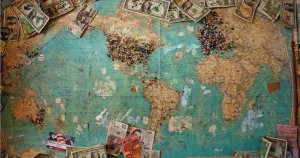Bryce Johnston, a two-time contributor, is an Army Officer and Fulbright Scholar who studied Development Economics at the IE School of Global and Public Affairs in Madrid, Spain. He holds a BS in American Politics from the United States Military Academy and tweets infrequently from the handle @am_bryce. The views in this article are his own and do not represent the official stance of the United States Army.
Ray Dalio, famous hedge fund manager and author of Principles for Dealing with a Changing World Order, is worried about the US Dollar. His fear: that it will soon lose its vaunted status as the reserve currency of the world.
If you’re new to the concept of reserve currencies, here are the basics. Countries hold large quantities of select foreign currencies in reserve to conduct international trade, invest abroad, and regulate their domestic currencies. Throughout history, some currencies have been stronger than others leading them to become the leading reserve currency of the world.
In the aftermath of World War II, as the United States lent and invested enormous sums in reconstruction efforts, the US Dollar became the common language of international business. To this day it retains its status as the world’s leading reserve currency. As a result, most international business transactions are cleared through the Federal Reserve, granting the US government great leverage to moderate exchanges.
Young Americans today have never known a world in which they didn’t experience the “exorbitant privilege” of so-called “Dollar Hegemony.” At the domestic level, this means that the US can easily borrow money cheaply and maintain price stability. Perhaps more significantly, however, it increases the power of American economic sanctions, because the US acts as a gatekeeper for the international economy. For example, in 2014 the United States banned a French bank from clearing trades after they did business with Cuba. This ban cut off Cuba’s ability to buy exports and deterred other actors from trading with them.
Thus, dollar hegemony remains an important pillar of national security in a time of great power competition. Rising tensions between the US and Russia over Ukraine have elevated the importance of economic sanctions as a viable alternative to overt conflict. Supporters of sanctions argue that the United States could target Russia’s oil and gas industry and strip its oligarchs of many of their assets while avoiding direct military engagement. Such a move would severely damage Russia’s economy, potentially causing a political crisis with ripple effects across the globe.
There are doubts, though, that this strategy would work in today’s environment. For one, a Department of Defense report found that the US Dollar has become more vulnerable in the 21st Century due to calls from other countries to replace it as the world’s leading currency. At the same time, Russia and other countries have bolstered their foreign reserves with gold to shield themselves from the threat of US sanctions.
The transition to alternate currencies could be accelerated by the introduction of Central Bank Digital Currencies (CBDC), such as China’s Digital Yuan. The Winter Olympics served as a soft release of the Chinese CBDC to foreign markets. Officials from Beijing reported that visitors used the currency to make $315,000 in transactions each day during the games. The Digital Yuan offers several structural improvements to the US Dollar that make it easier for users to buy goods and transfer money. That convenience could make it a popular reserve currency in the future, although it’s important to keep in mind that CBDCs could empower authoritarian leaders to expand their surveillance regimes, as I wrote in Spectacles previously.
Despite the current trends, the displacement of the US Dollar as the reserve currency of the world would take considerable time. Indeed, China’s efforts will be an uphill climb due to their government’s complicated relationship with outside investors. That’s not to say that the US shouldn’t take these challenges seriously. It is inevitable that the US Dollar will one day lose its status as the reserve currency of the world, but there is no reason that this needs to occur in the coming decades as Dalio fears. A report released earlier this month confirms the Federal Reserve is working on a CBDC codenamed Project Hamilton. Innovative technologies like this that could increase the appeal of the Dollar may prove essential in securing America’s global influence and disempowering regimes that might do democracy harm.
Subscribe to Spectacles



Comments
Join the conversation